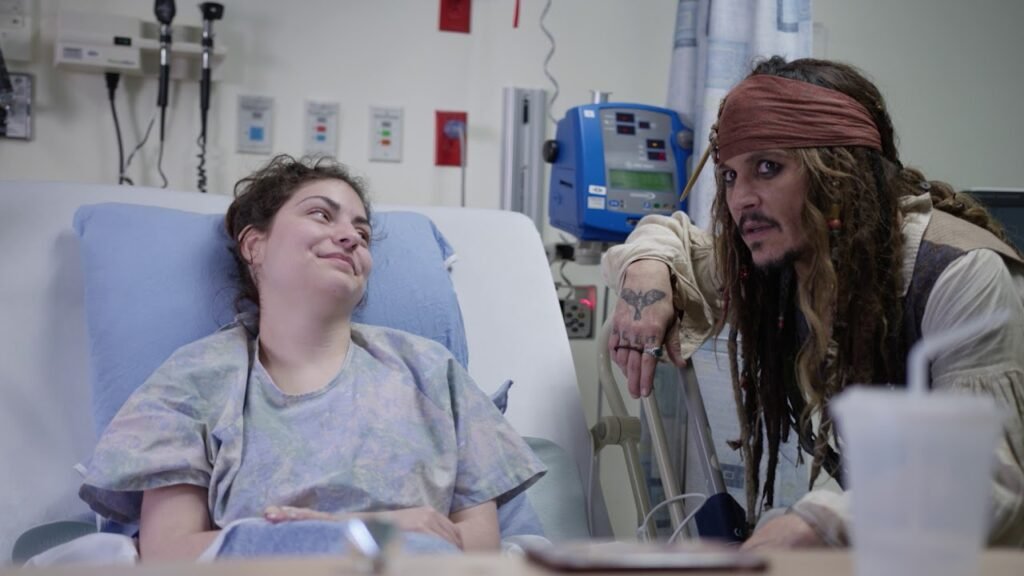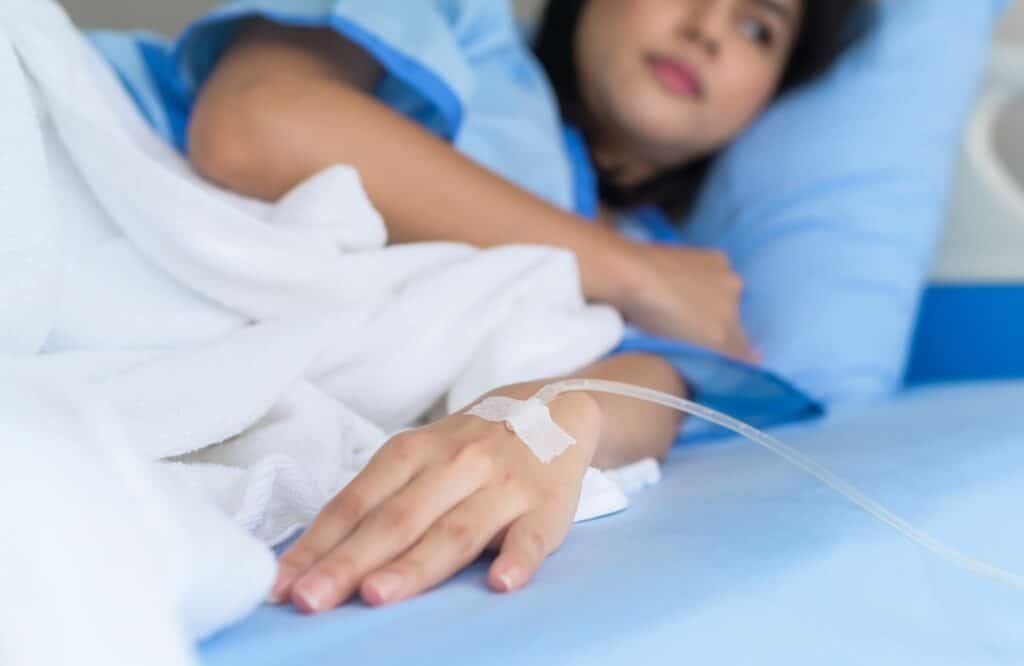
No one is truly prepared for an emergency.
Johnny Depp revealed the darkest period of his life when his daughter Lily-Rose was admitted to Great Ormond Street Hospital in 2007.
His daughter, with ex Vanessa Paradis, was in the children’s hospital for nine days suffering from kidney failure caused by E.coli poisoning. Johnny Depp would visit her regularly until they discharged her upon her recovery. Lily-Rose Depp has since fully recovered.
After his daughter’s recovery, Johnny said on the Graham Norton Show:
“I’ve always kind of done these visits,” Depp said, “but after that, the visits became more and more important. Because the kids — bless them — you know, they’re so strong, they’re so courageous. But the parents are the ones who are slowly dying. And to be able to bring a smile or a giggle to these people is — it means everything in the world to me.”
Following Lily-Rose’s recovery and release from the hospital, Johnny appeared on the Graham Norton Show and discussed returning to the hospital (where he is a frequent visitor) to cheer up patients dressed as his Pirates of the Caribbean character, Captain Jack Sparrow. Depp said:
“For me, it’s a gift. They give me the gift.”
He shows kindness. Ailing children can meet and greet their hero. As a sign of his gratitude and appreciation to the Great Ormond Street Hospital staff, Johnny has made several donations totaling $2 million because they saved his daughter’s life.
During the COVID-19 pandemic, Johnny dressed as Captain Jack Sparrow for a virtual visit to surprise the young patients at Queensland Children’s Hospital in Australia. He conducted the virtual call in Captain Sparrow’s accent and decorated a pirate-themed room to complete the video call’s setup.
He connected with the patients through playing games, engaging in conversations, and answering questions in the true spirit of fun – through the expression of Captain Jack Sparrow.
I believe that Johnny Depp is a kind-hearted man who wants to bring light to sick children during their darkest times. Visiting children in hospitals dressed up as his fictional character Captain Jack Sparrow and making donations as gratitude for the hospital saving his daughter’s life is how he expresses his philanthropic nature.
His daughter, Lily-Rose Depp, was diagnosed with temporary kidney failure. Though it could have been fatal, she recovered with the help of doctors and other hospital staff. I can relate.

My Lily-Rose Depp Story
In 2018, I became afflicted with rhabdomyolysis — a rare but life-threatening condition. Abbreviated “rhabdo,” the condition occurs when damaged muscle tissue releases toxic levels of proteins and electrolytes into the blood. Rhabdo can seriously damage the kidneys and lead to renal failure, just like in Lily Rose’s case. The condition can be fatal. My blood tests showed a serum creatine kinase (CK) level over 200,000 U/L. The higher the levels, the more likely it is that kidney damage or failure could occur. The doctor advised that I needed fluids to reduce strain in the kidney until levels decrease. Following my diagnosis, the doctor recommended that I be admitted to the hospital – where I remained for eight (8) days.
I find hospitals fascinating, largely because of the harmony-discord dichotomy among the stories of nurses, patients, and doctors. Through the halls of these institutions runs a complicated relationship between power, suffering, and healing. By definition, hospitals are sites of major life events. During my stay, I encountered many people with intricate stories and unknown fates.
There are monitors that constantly beep. There’s a mix of sounds including people swearing, moaning, and crying. There’s silence. There’s a space where sound changes from a mix of beeps and code calls to individual sounds of people being treated in their rooms. A nurse or doctor is asking questions of a patient. And there I am, behind the closed curtain, wondering if I’m next.
I remember seeing an elderly couple in the visitors’ room. The lady was in a wheelchair, with her husband sitting next to her. For the half-hour that I watched, they did not exchange a word, they just held hands and looked at each other — a few times the man gently patted his wife’s face. Their expressions of love were so deep that I felt I was sharing in their communion. Afterward, I was shaken and inspired by their pain and their passion, something sad and also joyous, revealing the complexity and fullness of a human relationship.
Typically, the first nights in the hospital are extremely taxing, both physically and mentally. I arrived in the Emergency Department just before midnight. It took over three (3) hours to be seen by a doctor and to receive the diagnosis of rhabdomyolysis.
People of all ages were seated in the waiting area (including children), desperate to be seen by a doctor. Ultimately, to be saved. I knew I was in for a very unsettling night.
On Day 7 in hospital, I woke up and decided to make a difference. Next to me, an older lady held an iPad and looked unhappy; I asked if everything was alright. The lady wasn’t able to call her granddaughters. I made it my task to fix her iPad. In less than an hour, she kissed me on the cheek and happily dialed her family. I was exceedingly motivated to find my next good deed.
My bedside table was a mess — magazines, cosmetic essentials, bags of food, and dirty clothes. I started cleaning up the mess. I looked into the bags and saw that I had plenty of varied fruits – including bananas, peaches, apricots, oranges, and apples. I could not eat them all, so I shared.
I went for a walk. I approached every single patient in the Acute Medicine Department and gave away goodies. I politely chatted with every one of the patients. The time flew by quickly, and I found myself back in my bed to rest my legs just in time for tea. I met everyone in both wards and was delighted that I could make other people happy.
On the day that I was discharged from the hospital, I thanked all of the doctors and staff and hugged my fellow patients. I concluded that I underwent a life-altering experience.
My body and spirit were broken at the start of my inpatient hospital stay, but I truly came out of it stronger and more at peace. I now understand that body and soul cannot be separated for treatment, for they are one and indivisible.
We must heal sick minds as well as sick bodies.
My good friend in the United Kingdom went through an excruciating experience with her youngest son. Nine years ago, her son was diagnosed with Wolff-Parkinson-White Syndrome. His heart rate reached 298 bpm (beats per minute) and he was feeling poorly. Doctors fought hard to bring him back around, and since then he’s been through myriad procedures, operations, and treatments for a variety of reasons.
My friend’s son is now 10 years old, and a few months ago he was given a clean bill of health. Her son is a warrior, a hero, an inspiration. He still faces some challenges related to the syndrome, but by all indications, he will live a full life. As Johnny Depp so wisely stated:
“The kids are so courageous, so strong, so resilient… but the parents are the ones who are slowly dying.”
Every day is a miracle
When you’re in the throes of grief, the world can lose color. But when we choose to see and appreciate the miracles that we are and that surround us, the beauty of living a radiant existence can return. I now know that every day is a miracle. I’ve taken notice of and experienced kindness in the world.
It is hard to admit that I kind of miss my days in the hospital. I don’t miss the smell, the food, or the midnight screams of patients in pain. But I do miss the slower pace that made me slow down, reflect, and ultimately be grateful for all I have.
As I move on in life, I am counting my learnings as well as my blessings.
- Life is too short for what-ifs.
- Nothing in this life is forever.
- Things always work out — one way or another.
- Invest in relationships that are an absolute “yes”.
- Always take that extra trip to visit family.
- I am the source of my own happiness.
- There are things I can’t control, but I can control my responses to them.
- I am who I am — and that’s enough.
About Partners In Men’s Health (PMH)
At PMH, you can contact us via e-mail or by using the form below to seek support and guidance from our trauma-informed Confidential Concierge Coaching services that will help you get “out of the fog and into the light.”
PMH is run by Dr. Jamie, the Clinical Conductor of this Transformational Team. He is a trauma-informed psychologist, Licensed Clinical Social Worker, and Certified Compassion Fatigue Therapist.
For 30 years, he has been helping people overcome their traumatic, degrading experiences using a comprehensive trauma-informed approach that lifts the mind and spirit in difficult situations when dealing with Toxic Abusive Relationships.
He has seen it all — the painful after-effects of domestic abuse, toxic abusive relationships, and long-lasting Complex Post-Traumatic Stress Disorder (CPTSD). He has been there, where many men are right now.
Mayo Clinic states that domestic violence against men can have devastating effects. Please don’t let anyone abuse you. You are good enough; don’t let anyone tell you differently.